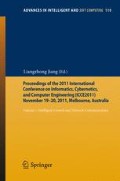Abstract
An extension algorithm, exponentially weighted dynamic principal component analysis (EWDPCA) algorithm is proposed to monitor the dynamic process, in particular for disturbances and set points changes in process. The technique is validated through simulation in the process of actual chemical polymerization. The results show that the EWDPCA algorithm can eliminate the linear relationship among variables and reflect the real-time information in dynamic process.
Access this chapter
Tax calculation will be finalised at checkout
Purchases are for personal use only
Preview
Unable to display preview. Download preview PDF.
References
Wold, S.: Exponentially Weighted Moving Principal Component Analysis and Projection to Latent Structures. Chemometrics and Intelligent Laboratory Systems 23(11), 149–161 (1994)
Dayal, B.S., MacGregor, J.F.: Recursive Exponentially Weighted PLS and Its Application to Adaptive Control and Prediction. Journal of Process Control 7(3), 169–179 (1997)
Qin, S.J.: Recursive PLS Algorithms for Adaptive Data Monitoring. Computer and Chemical Engineering 22(4-5), 503–514 (1998)
Li, W., Yue, H.H., Valle-Cervantes, S., et al.: Recursive PCA for Adaptive Process Monitoring. Journal of Process Control 10(5), 471–486 (2000)
Lane, S., Martin, E.B., Morris, A.J., Gower, P.: Application of exponentially weighted principal component analysis for the monitoring of a polymer film manufacturing process. Transactions of the Institute of Measurement and Control 25(1), 17–35 (2003)
Fortescue, T.R., Kershenbaum, L.S., Ydstie, B.E.: Implementation of Self-tuning Regulators with Variable Forgetting Factors. Automatica 17, 831–835 (1981)
Ku, W., Storer, R.H., Georgakis, C.: Disturbance rejection and isolation by dynamic principal component analysis. Chemometrics and Intelligent Laboratory Systems 30, 179–196 (1995)
Author information
Authors and Affiliations
Editor information
Editors and Affiliations
Rights and permissions
Copyright information
© 2011 Springer-Verlag Berlin Heidelberg
About this paper
Cite this paper
Zhou, Y., Wang, Q., Yang, G., Qiu, D. (2011). Research of the New Principal Component Analysis Algorithm Based on the Dynamic Model. In: Jiang, L. (eds) Proceedings of the 2011 International Conference on Informatics, Cybernetics, and Computer Engineering (ICCE2011) November 19-20, 2011, Melbourne, Australia. Advances in Intelligent and Soft Computing, vol 110. Springer, Berlin, Heidelberg. https://doi.org/10.1007/978-3-642-25185-6_64
Download citation
DOI: https://doi.org/10.1007/978-3-642-25185-6_64
Publisher Name: Springer, Berlin, Heidelberg
Print ISBN: 978-3-642-25184-9
Online ISBN: 978-3-642-25185-6
eBook Packages: EngineeringEngineering (R0)

